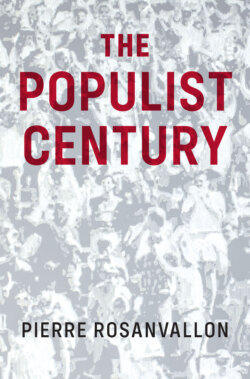Читать книгу The Populist Century - Pierre Rosanvallon - Страница 19
The cult of referendums and the apologia for direct democracy
ОглавлениеIn France, it was in the mid-1980s, as the Front National was beginning to gain ground in the voting booths, that that right-wing party made the extension of referendum procedures one of its major campaign themes. Calling for a “true French revolution,” Jean-Marie Le Pen spoke of the need to “enlarge democracy” in this manner, in order to “restore speech to the people.”2 He described referendums as “the most perfect expression of democracy.” And he called at the same time for the introduction of a specific type of “veto-referendum” that would allow the people to “oppose the promulgation of laws adopted by the Parliament but of which the people disapproved.”3 A little later, the Front National program for the 1997 legislative elections became more precise, proposing to extend the use of referendums “to liberate the French people from the yoke of the political class”: a “popularly initiated referendum” was supposed to allow citizens to decide for themselves on issues submitted for their consideration.4
The intellectual circles that accompanied the Front National’s rise in strength during that period, concentrated in institutions such as the Club de l’Horloge (an elite right-wing think tank promoting nationalism) or GRECE (a militant right-wing “group of research and study for European civilization”), were simultaneously pursuing this celebration of direct democracy by connecting it with the Swiss tradition, which they described as a model democracy rooted in history and careful not to allow itself to be denaturalized by foreign bodies. It was thanks to direct democracy, they argued, that Switzerland was able to protect itself from fiscal abuses and from massive immigration.5 Direct appeals to the public were thus presented as the way to get rid of the old elites – politicians and oligarchs – while guarding against the danger of invasion by “unassimilable” immigrants; the traditional representative system was relegated to a sort of prehistory of democracy. All later populist movements have adopted this vision of direct democracy, which they see as an effective instrument to be used by a healthy and fully sovereign people for sidelining corrupt and incompetent elites. Moreover, referendums present a powerful performative specificity, since by speaking out – seizing the floor – in this way the people are thought to be expressing a directly active will, thus breaking with all the temporizing on the part of the politicians.
The way the 2005 referendum on the European Constitution was sidestepped three years later by the French Parliament’s ratification of the Treaty of Lisbon made a deep impression in France. If one had to settle on the moment when the populist groundswell began to expand in the country, this would certainly be the symbolic date to choose. Ever since, populist figures have foregrounded the democratic character of referendums as opposed to the propensity of representative parliamentary systems to confiscate the sovereignty of the people. Eleven years after the French signed the Treaty of Lisbon, the affirmation of the popular preference for Brexit was similarly contrasted with the contrary aspirations of the majority of members of the British Parliament. And throughout Europe one could see, in populist milieus, a revival of interest in the Swiss procedures for popular initiatives and voting, thanks to which Christophe Blocher’s UDC (the Democratic Union of the Center, or Swiss People’s Party) was repeatedly able to dictate the agenda for the country’s debates. Indeed, populist regimes all over the world have been resorting to referendums in order to solidify their legitimacy and often to increase the prerogatives of the executive branch. In such cases, referendums frequently look very much like plebiscites. But this issue has scarcely been examined in populist circles, whether on the right or on the left, so firmly has the democratic perfection of the referendum procedure come to seem self-evident.
